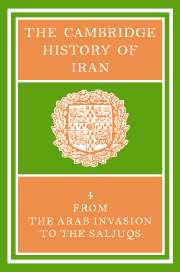Book contents
- Frontmatter
- 1 THE ARAB CONQUEST OF IRAN AND ITS AFTERMATH
- 2 THE ‘ABBĀSID CALIPHATE IN IRAN
- 3 THE ṬĀHIRIDS AND ṢAFFĀRIDS
- 4 The SĀMĀNIDS
- 5 THE EARLY GHAZNAVIDS
- 6 THE MINOR DYNASTIES OF NORTHERN IRAN
- 7 IRAN UNDER THE BŪYIDS
- 8 TRIBES, CITIES AND SOCIAL ORGANIZATION
- 9 THE VISUAL ARTS
- 10 NUMISMATICS
- 11 THE EXACT SCIENCES
- 12 LIFE SCIENCES, ALCHEMY AND MEDICINE
- 13(a) PHILOSOPHY AND COSMOLOGY
- (b) SŪFISM
- 14 THE RELIGIOUS SCIENCES
- 15 SECTS AND HERESIES
- 16 NĀSIR-I KHUSRAU AND IRANIAN ISMĀ‘ĪLĪSM
- 17 ZOROASTRIAN LITERATURE AFTER THE MUSLIM CONQUEST
- 18 ARABIC LITERATURE IN IRAN
- 19 THE RISE OF THE NEW PERSIAN LANGUAGE
- 20 (a) THE “RUBĀ'Ī” IN EARLY PERSIAN LITERATURE
- (b) ‘UMAR KHAYYĀM: ASTRONOMER, MATHEMATICIAN AND POET
- Bibliography
- Index
- Plate section
- Plate section">
- Map 1. Iran under the Abbasids">
- References
12 - LIFE SCIENCES, ALCHEMY AND MEDICINE
Published online by Cambridge University Press: 28 March 2008
- Frontmatter
- 1 THE ARAB CONQUEST OF IRAN AND ITS AFTERMATH
- 2 THE ‘ABBĀSID CALIPHATE IN IRAN
- 3 THE ṬĀHIRIDS AND ṢAFFĀRIDS
- 4 The SĀMĀNIDS
- 5 THE EARLY GHAZNAVIDS
- 6 THE MINOR DYNASTIES OF NORTHERN IRAN
- 7 IRAN UNDER THE BŪYIDS
- 8 TRIBES, CITIES AND SOCIAL ORGANIZATION
- 9 THE VISUAL ARTS
- 10 NUMISMATICS
- 11 THE EXACT SCIENCES
- 12 LIFE SCIENCES, ALCHEMY AND MEDICINE
- 13(a) PHILOSOPHY AND COSMOLOGY
- (b) SŪFISM
- 14 THE RELIGIOUS SCIENCES
- 15 SECTS AND HERESIES
- 16 NĀSIR-I KHUSRAU AND IRANIAN ISMĀ‘ĪLĪSM
- 17 ZOROASTRIAN LITERATURE AFTER THE MUSLIM CONQUEST
- 18 ARABIC LITERATURE IN IRAN
- 19 THE RISE OF THE NEW PERSIAN LANGUAGE
- 20 (a) THE “RUBĀ'Ī” IN EARLY PERSIAN LITERATURE
- (b) ‘UMAR KHAYYĀM: ASTRONOMER, MATHEMATICIAN AND POET
- Bibliography
- Index
- Plate section
- Plate section">
- Map 1. Iran under the Abbasids">
- References
Summary
INTRODUCTION
The Islamic conquest of Persia enabled the Persians to become members of a truly international society and to participate in a world-wide civilization in whose creation they themselves played a basic rôle. A homogeneous civilization which spread from the heart of Asia to Europe, possessing a common religion and a common religious and also scientific language, facilitated the exchange of ideas and prepared the ground for one of the golden ages in the history of science, in which the Persians had a major share. Islamic science came into being in the 2nd/8th century as a result of the vast effort of translation which made the scientific and philosophical traditions of antiquity available in Arabic. This early phase of activity reached its peak in the 4th/10th and 5th/11th centuries just before the Saljuq domination. During this period, which is among the most outstanding in the history of science, Persia was the main theatre of scientific activity, and although there were certainly many Arab and other non-Persian scholars and scientists, most of the figures who contributed to the remarkable philosophical and scientific activity of the age were Persians.
In a sense the scientific activity of this period continued what had been begun during the late Sāsānian period, but on a much greater scale and with a more universal scope. During the late Sāsānian period, there was some notable activity in astronomy, as seen in the Zīj-i Shahriyār, and also in medicine and pharmacology in which the activity of Burzūya, his journey to India and his causing the translation of Sanskrit texts into Pahlavī are reflected in later pages of history.
- Type
- Chapter
- Information
- The Cambridge History of Iran , pp. 396 - 418Publisher: Cambridge University PressPrint publication year: 1975
References
- 4
- Cited by

